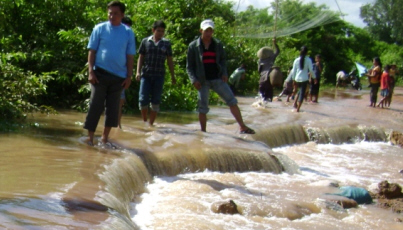After the devastating floods
of 2000 and 2001, the Member
Countries (Cambodia, Lao PDR,
Thailand and Viet Nam) of
the Mekong River Commission
(MRC) entered into
discussions to take drastic
steps towards the reduction
of damages to infrastructure,
economic losses and loss of
lives and livelihoods as a
result of extreme floods.
The Mekong River
Commissionís Joint Committee
and Council endorsed the
Flood Management and
Mitigation Strategy in 2001,
which was followed by the
implementation of a
dedicated Flood Management
and Mitigation Programme (FMMP).
Since 2004, the
implementation of the FMMP,
consisting of five
components have been
gradually developed and
achieved in line with the
MRCís Strategic Plan
2006-2010. Most of the
expected outputs already
have been or will have been
delivered by the early 2011.
Through its interventions,
FMMP has provided direct and
indirect support to the
Member Countries as per the
needs identified by them.

Although significant
progress has been made in
dealing with floods through
improved planning,
preparedness, forecasting
and warning, emergency
management and response,
rehabilitation, better land-use
etc. reality teaches us that
due to rapid economic
developments, population
growth, infrastructure
developments and land-use
changes the flood risk only
has increased. MRC prepares
for the continuance of the
flood management and
mitigation for another five
years in accordance with the
MRCís Strategic Plan
2011-2015 achieving its
regional mandate by
delivering its core
functions and supplementary
interventions with the help
of its National Mekong
Committee (NMC) and Line
Agencies (LA).
The Flood Preparedness,
Emergency Management
Strengthening and the Land
Management Component of the
FMMP 2004-2011 are community
centered activities and
directly address the needs
of flood vulnerable
communities in the Member
Countries. This also
indicate/guide the
strengthening and operations
of government agencies at
different levels i.e.,
national, provincial,
district and commune as well
as national and
international development
partners. This is vital for
enhancing communication,
coordination and cooperation
between these stakeholders,
as well as the consistency
of national disaster
management and mitigation
policy implementation.
Enhanced flood preparedness
and land management
practices are an important
factor in contributing to a
situation where the regular
Mekong floods cause
substantial damages to
public and private assets
and livelihoods. More
effective decision-making in
flood and land management
required the provision of
relevant and accurate flood
related information,
capacity building of
disaster management
officials, development of
flood management tools,
knowledge sharing and public
education and awareness.
Improvements in land
management by considering
flood probability
information provides direct
positive impact through the
reduction of damage to
agriculture and
infrastructure, but also
indirect benefits through
the avoidance of damage to
the most vulnerable parts of
the population living and
working in the flood plains.
With continued support since
2004 from the Government of
the Federal Republic of
Germany (FRG) represented by
the Deutsche Gesellschaft
fuer Internationale
Zusammenarbeit (GIZ)
GmbH and the
European Commission
Humanitarian Aid and Civil
Protection department (ECHO),
the Component 4 and
Component 5 of FMMP have
addressed enhancing
capacities and cooperation
among authorities and
organizations at various
levels of the Member
countries to apply more
efficiently appropriate
disaster preparedness,
emergency management and
land management policies and
tools in the field of flood
management.

While the Annual Mekong
Flood Forums (AMFF) has been
providing an opportunity
since 2002 to bring the
variety of stakeholders
around the globe to discuss
the achievements and
challenges to the Lower
Mekong Basin, the FMMP and
its implementing partners
has been actively engaged in
promoting and disseminating
the lesson learnt at the
province, district and
community levels linking
with the national
frameworks. In 2007, a
regional lesson learnt
workshop was organized in
Kon Kaen, Thailand on the
innovative approaches to
flood risk reduction in the
lower Mekong basin. Various
National Flood Forums and
Lesson Learnt Workshops
organized under the
component 4 and 5 has show
cased the good practices on
flood and land management
interventions by involving
the local authorities
The International workshop
on Flood Risk Reduction and
Land Management in the
Mekong River Basin:
Sustained Implementation and
Planning for Future
Challenges is jointly
organized by the Mekong
River Commission Secretariat
(MRCS), its technical
support partner such as
Asian Disaster Preparedness
Center (ADPC) and GFA
Consulting Group GmbH with
funding support from GIZ.
The workshop will provide an
opportunity for participants
of the international,
national and local level
planning, development
agencies and stakeholders to
enhance opportunities to
share experiences and
lessons, identify emerging
trends and strategies,
develop and enhance people-centered
approach to flood and land
management and mitigation in
the Lower Mekong Basin.